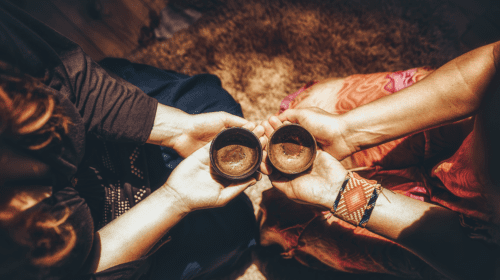I was pretty stressed out by the end of 2021. Even if the world hadn’t been experiencing a global pandemic, it still probably would’ve gone down as one of my least-rad years. I knew I had to confront the out-of-control pressure I was under, so I tried all the cliches people typically recommend. I ate healthier, exercised, went to bed early, and did yoga. A few weeks later however,14 hours into my latest anxiety spiral, I sat parked on the side of a west Texas road singing Hello! from Broadway’s The Book of Mormon with no gas, no cell reception, a 4-pack of Red Bull, and two stray dogs in my back seat. Whatever techniques I’d been advised on to manage stress, they clearly weren’t working.
Everyone gets stressed. How we experience stress is unique to who we are, so it makes sense that the way we cope should be equally personal. There’s no one-size-fits-all when it comes to feeling better, and sometimes you have to think outside the box when finding what works for you. The team at Recovery Unplugged have gone ahead and done the heavy lifting to find 5 unique activities you might not have tried yet that may help you recover from stress:
#1: Baking Bread
You’ll remember that bread baking became a huge pastime during Covid-19. Everyone was perfecting their banana bread recipes and bragging about their sourdough starters, and it was all very wholesome; but did you ever wonder – why bread? It seems to come down to two things: comfort and control. During quarantine, people struggled with uncertainty and lack of purpose in an unfamiliar world. With less travel and limited socialization, many began looking for ways to fill their time with something that would both distract them from the happenings of the world and give them a sense of control in a very limiting environment. Making bread from scratch is not a quick or fool-proof activity. It requires you to work with your hands to create something warm and comforting, making it a great hobby for stress management and a perfect introduction to behavior activation. Working with your hands allows you to channel anxious energy into what you’re doing, which helps your mind slow down and process information rather than simply reacting to it. The sense of pride you feel after creating something from scratch will also provide you with a sense of control, and sharing bread with others is an almost primal delight that allows for connection and community, after all – food is love. It’s no wonder there are entire organizations dedicated to baking bread with people struggling with depression, anxiety, grief, and trauma.
#2: Gardening
Gardening has always been associated with relaxation, but this is another activity that has surged in recent years – and it’s not just limited to people with gardens. The tending of both indoor and outdoor plants has long been associated with stress reduction by way of lowering blood pressure and improving mood. The desire to incorporate nature into our living spaces is one of the most noticeable design trends in the post-pandemic world. Like bread baking, gardening encourages you to work with your hands to create and care for something that connects you to nature. This interaction naturally lowers cortisol levels (the hormone responsible for stress responses), giving you the space you need to assess and prioritize your wellbeing.
#3: Dancing
TikTok is often mocked as being “that dancing app for kids”, and given its steady stream of dance challenges, it makes sense. But the kids may be onto something here. Dancing – like any form of exercise – releases endorphins and increases serotonin, which positively affects mood and functioning. Not only do you reap the physical benefits of dance, but the feeling of accomplishment in learning something new and the sense of community when dancing with others also helps to lower stress and contributes to self-esteem building. Additionally, learning steps to a dance – such as a trending dance challenge or a line dance – helps to develop new neural connections which can improve spatial awareness and long-term memory. There are plenty of easy-to-learn dances out there for every skill level, take a few minutes and see what all the hype is about!
#4: Scent Infusions
Candle-making, tea infusions, perfume oils, bath bombs…we all know someone who dabbles in these activities. As it happens, scent has a stronger link to memory and emotion than any of our other senses, but how does this reduce stress? By now I’m sure you’ve gathered that I am a big fan of mindfulness activities that use physical movement to channel focus, but you have other senses that can leave just as much of an impression on your wellbeing. Just as music can act as a catalyst to emotional healing, scent can connect us to parts of ourselves that are not easily accessible – especially when it comes to autobiographical memory. The power scent has over memory can work for or against you, but if you find a scent that evokes a happy response, it can do wonders to connect you to your deepest self where you can more easily identify your stressors. Applying happy or calming scents to candles, teas, oils, or whatever else you may like can be a fantastic way to both express your creativity and create a bond between aroma and wellness.
#5: Doodling
No matter what your teacher told you in elementary school, doodling is a great tool for anxious and ADHD brains. If you don’t have ADHD and aren’t sure what I’m talking about, imagine this: Your brain is a laptop with 10 tabs open, all playing different videos on a loop that never ends. Outside of the laptop, your boss is asking you to do a listicle about ways to cope with stress. You suddenly feel every stitch of clothing on your body tightening around you and seek to crawl out of your skin and into a dark cave before you suffer complete psychological collapse. That’s a lot of input to deal with, and if you don’t find a way to manage the mental load you’re carrying, you could end up with burnout. Doodling gives all minds – not just the ADHD ones – a line of focus. If your mind is racing, drawing basic shapes or repetitive patterns has been shown to reduce stress, channel attention, and promote creativity. It also has been shown to help with thought recollection and increased cognition.
So there you have it! If you’re looking for new ways to manage stress, I hope this listicle gave you some fresh ideas! But remember, if you need help managing stress, anxiety, depression, or addiction, Recovery Unplugged is here to help you learn your options and take the next step in your recovery.

























